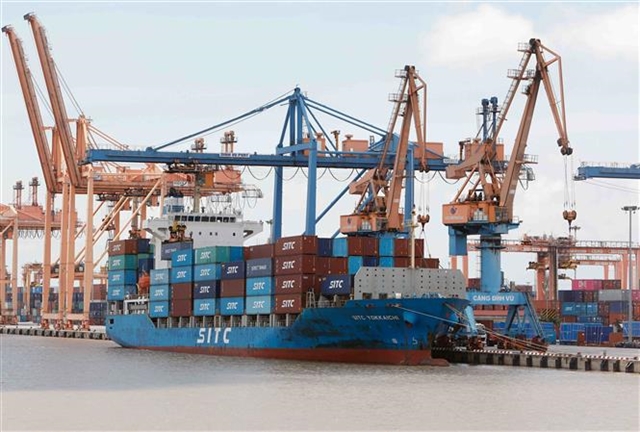Vietnamese companies need to strengthen their close ties with U.S. partners and industry associations.

As the results of the US presidential election are about to be announced, global companies are paying close attention. Whether Republican candidate Trump or Democratic candidate Harris wins, the new government will continue to implement international trade policies that protect the interests of American companies.
From 2018 to 2023, Vietnam’s exports to the United States will grow at an average annual rate of 15.3%.
In the first three quarters of this year, the United States remained Vietnam’s largest export market, with exports exceeding US$89 billion and a trade surplus of about US$78.5 billion, a year-on-year increase of 31%. This highlights the huge potential of the US market for Vietnam.
The latest consumer market report shows that American consumers’ spending on various goods continues to exceed expectations.
According to the National Retail Federation (NRF), total year-end holiday spending in the last two months of this year is expected to reach US$980 billion to US$989 billion, an increase of 2.5% to 3.5% over the same period last year.
Although the U.S. consumer market shows many positive signs, companies exporting to the U.S. remain cautious.
During the campaign, both the Republican and Democratic presidential candidates expressed their intention to raise import tariffs, but their tax increase policies were different.
Trump’s attitude is more radical. He initially proposed a 10% tariff on all imported goods, and recently raised the tax rate to 20%.
In contrast, Harris believes that Trump’s practice of imposing a 10% tariff on all imported goods will directly increase the spending costs of the American people. She suggested subsidizing domestic companies to develop industries such as clean energy, semiconductors, solar panels and electric vehicles through tax credits, which is equivalent to an indirect tax.
The difference between Trump and Harris lies mainly in degree and scale. Trump uses tariffs as a barrier to protect domestic production, while Harris, although setting a relatively low threshold, is also aimed at protecting American companies.
In general, the positions of the Democrats and Republicans on trade policy toward China have converged.
Therefore, these policies are unlikely to change fundamentally, regardless of the outcome of the US presidential election this month.
It is worth noting that although Biden strongly criticized the practice of imposing tariffs on China during the 2020 campaign, he continued Trump’s tariff policy after taking office.
How should Vietnamese companies respond?
From another perspective, the Saigon Economic Times quoted VinaCapital chief economist Michael Kokalari as saying that if Trump is elected, he is expected to focus more on weakening the dollar rather than imposing tariffs.
Raising tariffs will exacerbate U.S. inflation, while a weaker dollar will help the U.S. government solve many problems, including its huge debt.
He said a weaker dollar would boost Vietnam’s exports to countries other than the United States, while a 10-20 percent tariff on countries other than China would not erode Vietnam’s competitiveness.
In addition, reports from Standard Chartered Bank and other institutions show that if the United States imposes a 60% tariff on China, Vietnam and Mexico will once again benefit the most in terms of exports.
In a report released by VinaCapital in early September this year, Michael Kokalari pointed out that Vietnam is one of the three countries with the closest economic ties to the United States after Canada and Mexico.
Strong U.S. consumer demand is driving a recovery in Vietnam’s exports, manufacturing and GDP growth.
Despite the Federal Reserve’s sharp interest rate hikes, US consumption has maintained a good recovery trend this year.
Strong demand from American consumers for “Made in Vietnam” products has driven Vietnam’s exports to the United States from a year-on-year decline of 21% in the first seven months of last year to a year-on-year increase of 24% in the first seven months of this year.
As for the medium-term outlook after the US election, Michael Kokalari said that US consumer demand for “Made in Vietnam” products may slow down, but there will not be a sharp decline early next year.
Politicians from both parties in the United States want to move manufacturing back to the United States, which has not been achieved after China joined the World Trade Organization (WTO).
However, due to high manufacturing costs and a shortage of skilled workers in the United States, reshoring of manufacturing is unlikely to pose a serious threat to products made in Vietnam.
Most economists believe that Trump’s proposed import tariffs will have more negative than positive effects.
Tariffs will trigger trade confrontation and even trade wars, damage the interests of various countries, restrict global trade flows, disrupt supply chains, reduce overall economic growth, and inevitably bring about inflationary pressure.
Faced with the changes that may be brought about by the US election, Vietnamese companies need to be fully prepared and proactively formulate strategies to cope with the new economic situation.
VnBusiness online magazine quoted economic expert Nguyễn Hoàng Long as saying that Vietnamese companies need to strengthen their ties with US partners and industry associations.
He believes that this will not only help companies obtain local policy support in the United States, but also establish long-term and stable relationships with important strategic partners.
This becomes particularly important at a time when both presidential candidates tend to prioritize domestic economic interests, posing challenges for Vietnamese exporters.
One of the important factors that has helped Vietnam maintain and develop its economic relations with the United States is the protection provided by the global multilateral trading system, especially the World Trade Organization (WTO).
He added that it was crucial to ensure that U.S. policies did not have a negative impact on third countries such as Vietnam amid the potential escalation of U.S.-China trade tensions.







